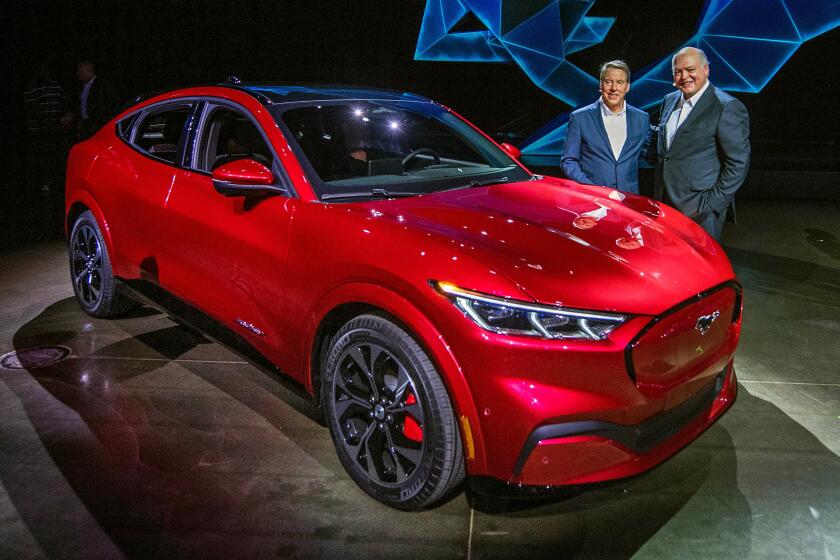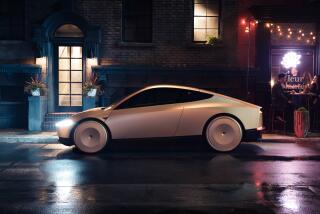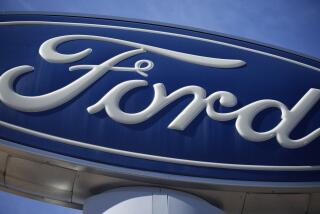Ford courts fleet buyers with new electric commercial vans
- Share via
Ford unveiled its new all-electric E-Transit van Thursday morning, and while not as flashy as the Mustang Mach E it unveiled late last year, the launch in some ways could prove more important to Ford’s zero-emissions strategy and perhaps to the public’s acceptance of vehicles that don’t run on gasoline or diesel fuel.
“If Ford does this right, the E-Transit van will be a very important vehicle for them, and for [vehicle] electrification in general,” said Mike Ramsey, an analyst at Gartner.
Gov. Gavin Newsom decreed in September that starting in 2035 nobody can sell new internal combustion cars in California. But so far, customers aren’t flocking to all-electric versions. Such cars account for only 5.8% of cars sold in California and 2% nationwide.
Ford hopes for a more energetic adoption rate for commercial vans. The argument is that buyers of commercial fleets are profit-oriented, and as they discover the total cost of ownership of electrics is significantly lower than fossil-fuel vans they’ll become early adopters.
Vans are typically used for local delivery or by construction workers, so range may not be the issue it is for family car owners. The electric vans introduced Thursday — which won’t be available until late next year, with a base price of $45,000 — come with a range of about 125 miles. According to Ford, the average daily mileage of its gasoline-powered Transit vans is 74 miles. So a nightly electron fill-up back at the depot should suffice.
Ford will also try to build a new business on top of the vans themselves: an over-the-air network to provide fleet management software by subscription, covering such things as dynamic routing, trip planning, charging management and a nanny device (Ford calls it Sync 4 voice assistant) that can audibly warn drivers if they’re speeding, braking too hard or not wearing their seat belts.
This “allows us to have more of an ongoing relationship with our customers,” said Bob Holycross, Ford vice president in charge of sustainability, environment and safety.
For construction workers, Ford will offer a “generator” system that allows power tools to be plugged into the vehicle’s battery as an option.
Ford makes about 150,000 commercial vans a year and is the No. 1 commercial van provider in the U.S. and Europe. Its U.S. market share is “nearly 50%,” Holycross said, though the company doesn’t break out exact figures in its financial statements. The company has led the commercial van market for more than 40 years, according to Ford.
Ford turns to electrified pickups, performance cars and SUVs to meet California’s greenhouse gas regulations.
The company is also tops in pickup truck sales, by far. The F-150 is the bestselling vehicle of any kind in the U.S. Big commercial van buyers also tend to buy pickup trucks too. Ford plans to introduce an electric F-150 pickup in 2022. The over-the-air fleet management software systems will be available on pickup trucks too.
“Ford is able to offer a commercial fleet buyer a wide variety of products, whether commercial vans or a [smaller] Ranger-style pickup or an F-150 or a heavy-duty pickup truck,” said Stephanie Brinley, an analyst at IHS Markit.
Another advantage for Ford: a network of more than 600 commercial vehicle service and maintenance locations, 90% of which are being equipped for electric vehicles. “Ford has the best commercial dealership service,” said Ramsey, translating into “big comfort in buying Ford.”
Though it might have a big lead, General Motors and Fiat Chrysler Automobiles’s Dodge unit sell vans and pickups too, Brinley said.
Perhaps more significant are new players. Amazon has ordered 100,000 commercial vans over the next 10 years from Michigan start-up Rivian — which counts as its investors Amazon, and, curiously, Ford.
The E-Transit vans will be built at a Ford plant near Kansas City, Mo. Production levels will be flexible, depending on demand. “Our goal is to be able to meet demand as it comes in,” Holycross said.
The cost savings for electric vans — mainly in the form of lower fuel and maintenance costs — could well swing fleet buyers to electric vans, Brinley said. But right now those savings are “in theory.” Fleet buyers will need a few years of experience to adequately judge the potential of electric vans, she said.
Ford is sinking $11.5 billion into electric vehicles and other new vehicle technologies. The Mustang Mach E compact SUV goes on sale later this year.
More to Read
Inside the business of entertainment
The Wide Shot brings you news, analysis and insights on everything from streaming wars to production — and what it all means for the future.
You may occasionally receive promotional content from the Los Angeles Times.












